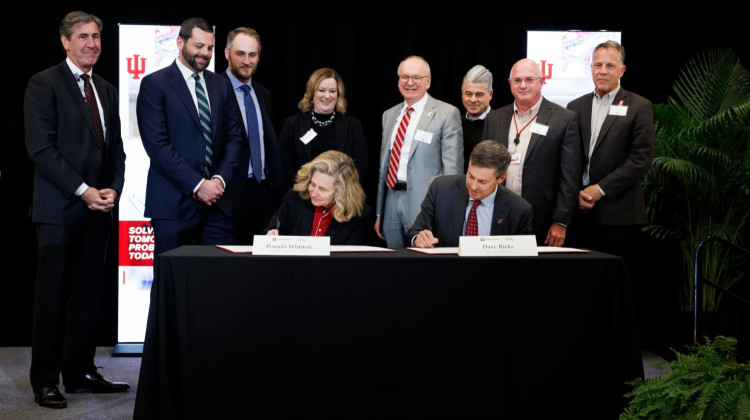
Principal Tom Hakim at Cold Spring Elementary, one of the Indianapolis schools exploring substance misuse prevention programs.
Jill Sheridan/IPB NewsA growing number of groups are creating substance abuse prevention programs in schools, across the country. Many of the “evidence-based” programs show positive results, reducing the number of children who try heroin, cocaine or become long-term smokers.
In response to Indiana’s opioid epidemic, the Richard M. Fairbanks Foundation started research to see how it could make an impact.
President and CEO of the Foundation, Claire Fiddian Green says they began to ask a question.
"What if we could prevent people from becoming addicted in the first place?" says Fiddian Green.
Nearly 16 percent of Indiana high school students report having taken a pill that wasn’t prescribed to them. Fiddian Green says the research is clear.
"That if you start using substances as an adolescent you’re more likely to suffer from addiction later in life," Fiddian Green says.
But when the foundation surveyed 155 schools in Marion County, it found only 11 percent implement any type of prevention program.
Fiddian Green says schools said they don’t know what type of programs are best and they don’t have the time or resources.
That is now the aim of the Foundation’s $12 million Prevention Matters initiative – to help Indianapolis schools find the evidence-based prevention programs best suited to their needs.
Cold Spring School Principal Tom Hakim says it might really help his students.
"A kid may need this because they have abuse and neglect in their background or a kid may need this because their background has substance abuse," says Hakim. "If we can identify those things on the front end, I think it can inform the work we’re trying to do."
In January, the foundation announced non-competitive planning grants for any schools that apply. Indiana Prevention Resource Center will help those schools explore the more than 20 addiction prevention programs recommended by federal or state agencies.
Kathleen Anderson is a community prevention specialist at the center. She says preventing substance misuse is similar to preventing other diseases.
"Just like heart disease has risk factors that lead to an increase likelihood, there are risk factors out there that show increase likelihood of substance use among youth," says Anderson.
Some of those factors are academic problems, mental health issues, poor relationships and poverty.
Anderson says, in middle school or high school, they can give young people tools – protective factors.
"It’s a lot of goal setting communication, education, building in those skills that youth need in order to resist peer pressure and make good decisions in addition to education about substances and their harmful effects," Anderson says.
Cold Spring Elementary is one of many applying for a “planning grant.” The elementary school pulled data on all its students, including information on school suspensions and calls to the Department of Child Services. Principal Tom Hakim says students face different social and emotional challenges.
"What we do know is what we see everyday in our buildings and we have kids that are broken," says Hakim.
He says a greater understanding of the importance of these school prevention programs can have a lasting impact.
"I think we’re getting closer to admitting that there are a lot of pieces that come into play," says Hakim. "It’s why we’re bringing in community mental health support. It’s why adding social workers to school buildings and ramping up the number of psychologists available."
To address the root causes of issues that can lead to a lifetime of addiction, he says you have to ask what has happened to each individual student.
READ MORE: Trauma-Informed Care At Work In Indiana
"As we look at prevention are there things that, certain mind sets or things we can expose them to that wouldn’t fully prevent anything but at least put them in a path of decision making that would help them process through not going down that path?" says Hakim.
The foundation will announce the schools chosen for the three year implementation grants this summer.
 DONATE
DONATE








 Support WFYI. We can't do it without you.
Support WFYI. We can't do it without you.